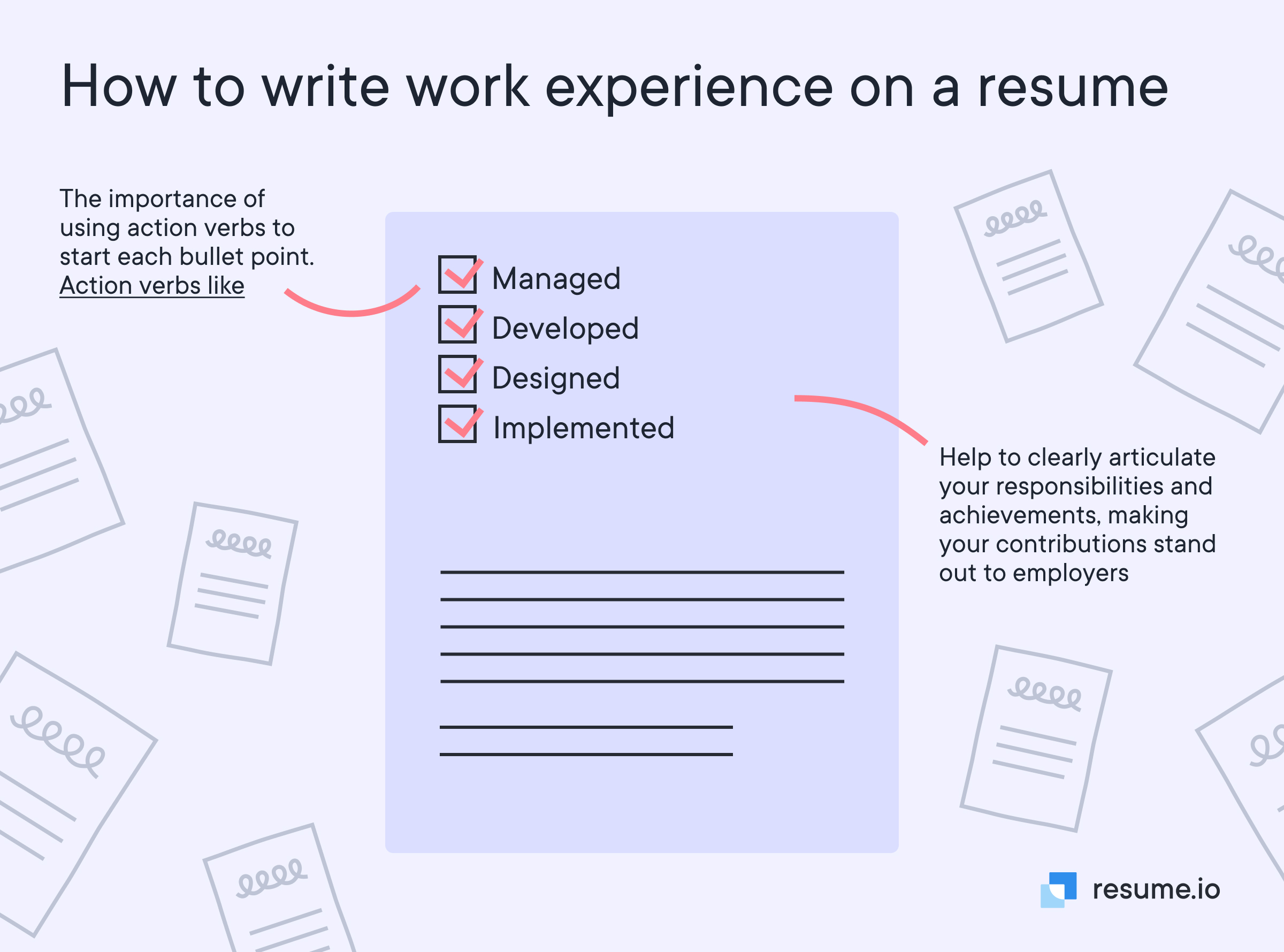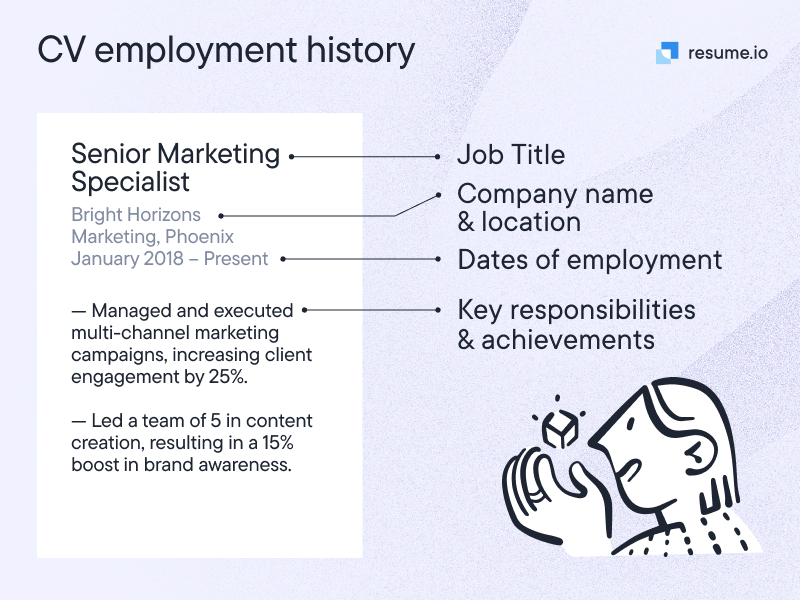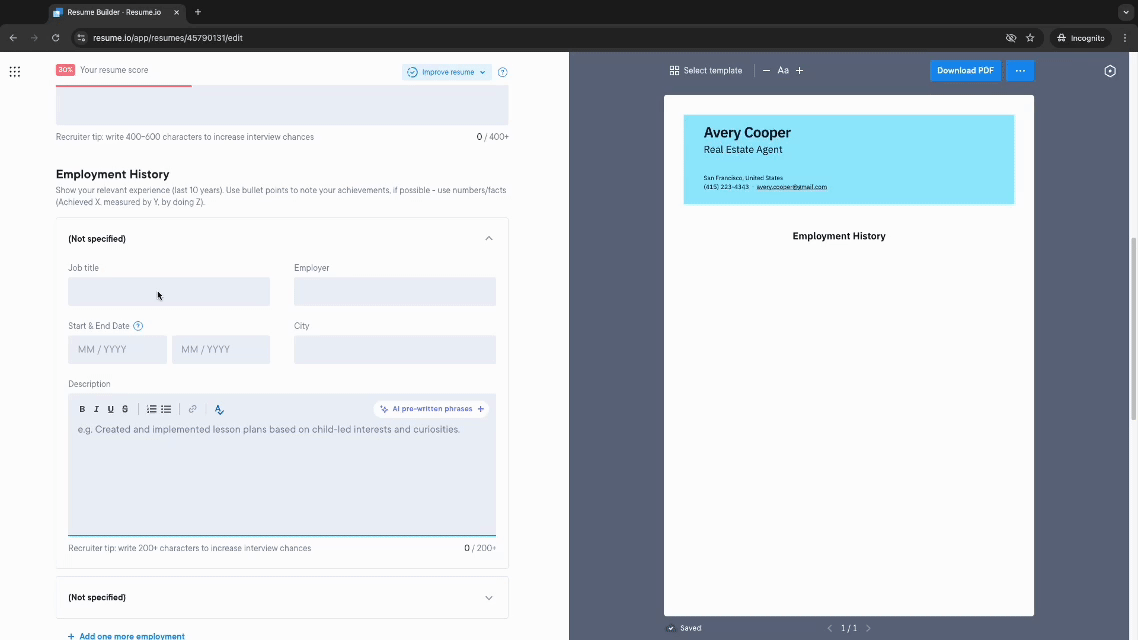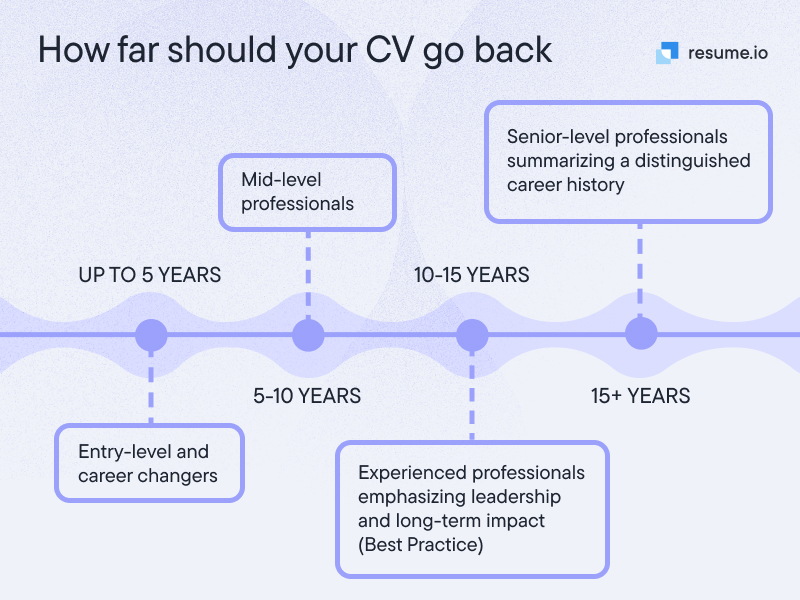When it comes to writing your CV, you should spend most of your time perfecting the work experience. Sure, you might agonise over which of your skills to include or what to say in the summary section, but it is the work experience that will draw the hiring manager’s eye first.
A quick scan of employer names and job titles will ensue. If there is enough initial interest, then they will likely linger over your last couple of roles for a while. Before they even look at your summary or skills. Job seekers can exaggerate their potential in a summary, but when you are sharing the details of your career accomplishments there is no fluff.
While the work experience section should be about your personal contribution, it is possible to retain the top-line detail of your achievements so that there is a level of opacity that can only be explored at an interview. That is the holy grail. Once you are in the interview room with an employer, you will be free to expand on all sorts of things.
In this blog, we explore how to make the work experience section of your CV sound as impressive as possible. We consider:
- Why work experience in a CV matters
- How to structure the work experience section
- What to include within work experience
- Mistakes when writing about work experience
- Tips for telling your career story,
Be proud of what you have achieved. The hiring manager will certainly be curious, so make sure that you present your accomplishments in the most tantalising way possible.
Why does work experience on a CV matter?
This might seem like a silly question but stick with us. The aim of a CV is not to “tell” a hiring manager that you can do the job. You have to “show” that you can do the job.
The only way to effectively demonstrate your future potential is to share past accomplishments that hint at your capabilities. It is not enough to repeat your previous responsibilities. Hiring managers need to know how good you are at the job, not just whether you have done it before.
The work experience section will be discussed for the majority of any interview - make sure that you start the stories that you wish to continue.

How to structure the work experience section

Whether you are going with a reverse-chronological or combination format, each work experience entry should be for one employer and the job or jobs that you carried out while you were there. There is no situation where two employers would be grouped together.
Start with the employer’s name, position title and dates of employment on one line. You may choose to put dates of employment lower, but why waste space?
You can then either offer a couple of sentences about the key challenges of the role and then a couple of bullet-pointed achievements, or you can get straight into the bullet points. Potential employers aren’t interested in the nice-to-know stuff on a CV. Everything in the work experience section should be factual and to the point.
If you have more than ten years work experience, a reverse chronological CV is the norm, with the latest work experience at the top of the first page (after summary). Combination or functional CVs which place more emphasis on skills may be more common for early career or gig economy workers.
The company name, position title and dates of employment should be in bold font. Ideally, they should be the same font size as the work experience details that follow. There is no objective reason to make them bigger. The bold font will be enough.
Lanwith Group, Marketing Manager
June 2017 - August 2020
- Led digital marketing campaign resulting in 30% increase in sales over 6 months.
- Managed a budget of $100K, focusing on social media ads and email marketing.
- Oversaw targeted marketing strategy boosting customer engagement by 40%.
- Executed a SEO strategy that improved website traffic by 50% within a year.
- Organised major product launch events, resulting in 20% increase in leads.
What to include within work experience

There is always a balance to strike between what you perceive as your “greatest career hits” and what you think will be required in the role.
Hiring managers love to read tales of success, but if there is not much of relevance to the job, they will be guessing as to your potential impact. On the other hand, if you only include accomplishments that are relevant for the role, they may see you as being somewhat one dimensional. Roles change, people get promoted, and new challenges appear – if you have a mind-blowing achievement that isn’t entirely relevant, by all means include it.
Try to only share the achievements that truly set you apart from the competition. If your accomplishments seem somewhat mundane, why should they invite you to an interview? Start the stories that you wish to elaborate upon during an interview.
Share awards or certifications that you received on the job. Not every hiring manager will scan the education section, so weave these in where appropriate. Brag about that employee of the year — then tell the hiring manager why you won it.
Finally, ask a colleague to check through your work experience section and compare it with the job description. Maybe they know about something from your career that you have forgotten about? A second pair of eyes is never a bad thing in this instance.
Mistakes when writing about work experience
When you need to put details for a fair few positions, space for listing your accomplishments is at a premium. While you don’t need to use the same number of lines for each role, it is still vital that this part of your CV is effective. You can’t afford to make the following mistakes. Hiring managers will assume that you don’t care.
- Don’t just describe responsibilities. Too many people copy and paste the responsibilities of the role within the work experience section. Don’t do this. Hiring managers know what they expect you to do – what they want to understand from you is whether you have the capability and potential to do it. Give them examples from your past to make your case.
- Avoid unnecessary filler words. Every word on your CV should earn its place on the page. When you want the hiring manager’s attention to be on the impressive detail of your work experience, you don’t want them being distracted by flowery word choices that add no substance to your career story. Keep the work experience section tight and powerful. Write the work experience in the third person to avoid scattering it with first person pronouns.
- Don’t leave periods of career inactivity blank. Briefly addressing the reason behind a career gap of more than 6-9 months is essential as you can get ahead of any potential questions. Smaller gaps can be covered up by just using years of service, but this can be misleading. Hiring managers know to look for this and will pounce on any uncertainty.
Tips for telling your career story
The work experience section is where most of a hiring manager’s attention will be focused. It is interesting to hear which skills that you possess and where you see your career going next, but there is nothing like reading some cold, hard, career facts.
Try to find a few common threads that run through your various roles – conveying a sense of consistency will be comforting for a hiring manager. You should present yourself as the person that can take the role to the next level, while doing so within your comfort zone.
Obviously, also do your best to create a sense of growth as you have moved from job to job. If it looks like you have been thoughtlessly job hopping, no amount of persuasion will dispel the doubts that it may happen again.
- Tailor your experience for each role. It is not so difficult to remove a bullet point and replace it with something else more suitable. Anything on your CV that is not relevant for the role is a risk – tailoring accomplishments ensures a more productive interview.
- Be as specific as possible. You don’t have to gloss over the details with a hiring manager who works in your industry. Get straight into the details of your quantifiable achievements – show that you are the industry expert that they are looking for. Quantify achievements with actual numbers or percentages - be careful not to share anything that is confidential.
- Use strong action verbs. Vocabulary really does matter when you consider that a hiring manager might be scanning through a hundred (more more) CVs. It is important to write it as you would speak, but throwing in impressive action verbs will not harm your application.
- Use industry-specific examples. While you may have worked in different industries previously, try your best to include accomplishments that would be transferable to the industry of the employer in question. You will not have the space within the work experience section to spell it out, but the hiring manager will read between the lines.
- How far back should work experience go? Your CV should ideally contain all work experience that is relevant for the role. Fifteen to twenty years is not too long to go back, and you can include less information for the older roles. Hiring managers sometimes want to understand the journey, so don’t be afraid to share your early career basics.

Key takeaways
It might take you a significant amount of time to craft this work experience section but remember that it will form the basis of a successful interview. Take care to select every word carefully and read it from the hiring manager’s perspective. Where are the gaps? What questions will they ask when they read it? What will impress them most?
- Write specific job-related accomplishments with numbers and stats.
- Make sure that each achievement is impressive enough.
- Don’t just pick your best career achievements. Are they relevant?
- Tailor your experience for each role that comes along — it will be worth it.




